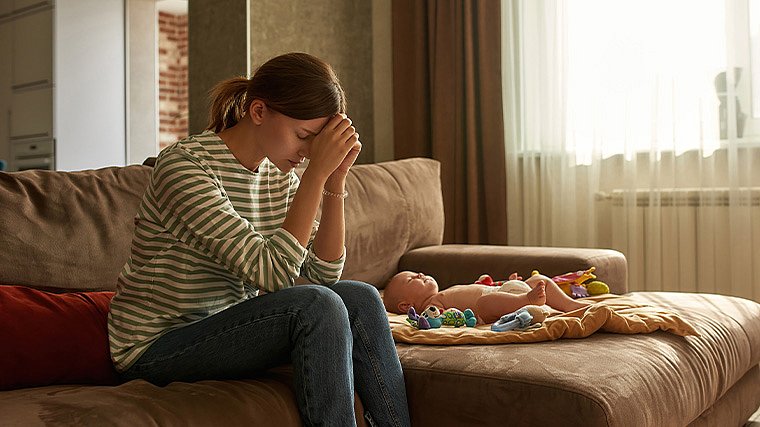Not everyone feels fulfilled as a parent
For many years, Poles have been declaring in social surveys that the most important value in life is family. According to a survey conducted by CBOS in 2019, “as in 2013, family happiness comes first for 83% of Poles.”[1] What is concerning, though, is that there is a growing proportion of people who find parenthood frustrating and overwhelming instead of feeling happy and fulfilled as a parent. This is true for both mothers and fathers.
Psychologist Joanna Drosio-Czaplińska explains: “The results of the recently published studies conducted at SWPS University are shocking. 12–13 percent of parents in Poland regret having children. This is almost twice as much as in Germany, even though Poles consistently place children very high on the scale of their life values. I personally believe these statistics to be underestimated. Perhaps the representation of the world from the perspective of a psychotherapist’s office is not entirely unbiased, but I often hear from my patients that parenthood is a big disappointment. Especially for women.
I hear them say that they’ve overestimated their abilities, including their mental capacity. Sometimes they even tell me that they find it difficult to touch their children, that they dislike them, that being a mother is emotionally exhausting and difficult to bear. What’s more, they’re unable to reconcile difficult feelings and thoughts with the fact that, in their own way, they love their children and feel responsible for them. (…) As for men, many of them mention the problem of poor parent-child bonding. During therapy, they confess that they find their children boring. They don’t know how to spend time with them or talk to them. When working remotely, many fathers committed even more time to their job, working three to five hours in overtime out of fear of being made redundant or to escape the family chaos.”[2]
Some parents may eventually feel burned out at some point. According to the definition, “parental burnout is a state of physical, mental and emotional exhaustion. Consequently, people who experience burnout feel chronically tired, which can lead to anxiety, fear, depression or suppression of the body’s immune system, increasing susceptibility to illness.”[3] Similarly to the professional burnout, affected individuals feel overwhelmed. They can no longer get any satisfaction from what they have done so far. They lose confidence in their parenting skills. They have less patience and may even distance themselves emotionally from their children.
What are the factors contributing to parental burnout?
COVID-19 lockdowns kept most of us from our daily routines but also locked us up in our homes 24/7 with other family members for months, depriving us of any means of psychological and physical respite, such as eating out, going for a swim or pursuing other activities of interest. There was a time when even going to the playground or park was prohibited. The effects of the pandemic on the physical and mental health of adults and children, as well as on family relationships, are concerning.
Parents found themselves in the most difficult situation. Almost overnight, they lost the help of kindergarten and school teachers, caretakers, psychotherapists and other people who looked after their children outside the home for a large part of the day. Consequently, they had to incorporate extra activities into their routine. As psychologist Joanna Drosio-Czaplińska explains: “During the lockdowns, the parents were alone with their children for many months, which made all the difficult feelings even harder to manage, though even before the lockdowns the trend to see both the ups and downs of parenthood in a realistic way was clearly visible. (...) A number of studies show that the frustration caused by the pandemic quickly escalated into higher levels of aggression. You can see it on the roads, and you can hear it in conversations with patients in psychotherapists’ offices. We know that there was more aggression among families with children. This is because their parents faced a larger burden than the rest of the society, without always being able to cope with difficult emotions – including the fears and concerns of their children, who felt lost and confused about the sudden changes.[4]
While on a plane, many people feel outraged on hearing the announcement: “In an emergency, put on your own mask first before assisting your child”. In fact, this is a very reasonable rule. If we are not well ourselves, we will not be able to help the child. The same principle applies to psychological issues. Parents who ignore their physical and mental health, and forget about proper rest and fulfillment in areas that are important to them, are more likely to experience fatigue, frustration and negative emotions that will also dominate the relationship with their child.
Perfectionism in parenting The quest to become the perfect parent who cares about every single aspect of raising a child first initially involves frantic juggling of the child’s various activities with joint family tasks. The initial phase then evolves into being overburdened with responsibilities coupled with a sense of guilt about neglecting so many things. After all, there are so many things you can do for your children: prepare special meals, sign them up for sensory integration therapy or language learning courses, arrange activities to develop creativity and social skills. Even if you devoted all your time to these things, you still wouldn’t be able to take care of everything. Guilt combined with perfectionism is a toxic mix both at work and in parenting.

Idealization of parenthood promotes disillusionment. In commercials, movies and social media, children are nearly always cute, smiling and well-behaved, and their parents beaming with love and happiness. Real life is completely different! There are conflicts, difficult emotions, and problems. Both children and parents may be upset, grumpy or irritable. So those who imagine that having a child is a constant string of happy times are bound to be disappointed. Life is a collection of wonderful and painful moments.
Sometimes parents, seeing a gap between their own family and the family image in the media, initially decide to try even harder. They read parenting guides, attend parent training workshops, practice attachment parenting, and keep inventing activities to do together. They devote all their energy to the child. They lose themselves in parenthood the same way workaholics throw themselves into their work. Even then, however, they fail to achieve the desired goal, as it is fundamentally unrealistic. As with excessive devotion to work, the phase of ‘workaholism’ is followed by the stage of psychophysical exhaustion marked by a sense of failure, frustration, and bitterness.
Neglecting your relationship and relegating your partner to the background are among other factors promoting conflict and burnout. Psychologists stress that happy and fulfilled parents are better role models for their children and give them more emotional support than parents who have sacrificed so much for their children that they have lost themselves in the process.
What are the ways to avoid parental burnout?
Make your expectations realistic both towards yourself as a parent and towards your child. Nothing is perfect – neither your job, nor you, nor your interpersonal relations, nor your relationship with your children. Life is a mixture of good times and bad. Give yourself an inner permission to pursue your own desires and goals. As a parent, you have to be ‘good enough’, but you don’t need to be perfect.
Work through your own problems, traumas, and destructive patterns. You can’t undo the past. If your parents were dysfunctional or you were a victim of domestic abuse, you are scarred. But the trauma of your childhood doesn’t need to shape the rest of your life. You can break toxic generational patterns, build healthy relationships, and become a supportive parent even if you didn’t have good role models in your childhood. However, as highlighted by Dr. Konrad Piotrowski from SWPS University, an author of pioneering research on parenting: “Results to date have shown that parents who regret having children are more likely to have had a traumatic childhood marked by abuse and rejection, report more pronounced symptoms of depression and anxiety, are more sensitive to social evaluation, and experience severe parental burnout. Regrets about having children are also linked to the financial situation and marital status. Financial problems and single parenthood significantly increase the likelihood that a parent will regret their decision to have a child.”[1]
Surround yourself with a support network – as the old adage goes: “it takes a village to raise a child.” Make a list of people who can help you take care of your child – even if only once in a while or for a fee (such as babysitters, caretakers, psychologists). If you are friends with other parents, suggest taking care of the children together or engaging in joint activities. Don’t be ashamed to ask for support.
Share tasks with your partner – not only household chores, but also care over children. Don’t take it all on yourself.
Create space for your emotions and those of your partner and children. Don’t ignore painful or embarrassing feelings. Discuss them in a constructive way within the family and teach your children the same. This will bring tangible benefits to everyone in the long run.
Have ‘psychological safety valves’ – make some time only for yourself. Even if only 30 minutes a day. The more tired and stressed you are, the more likely it is that you experience burnout in your work life and family relationships.
Find a balance between your role as a parent and other social roles. You have many roles to play in life: you are a parent, but also a husband/wife or partner, an employee, a friend, and so on. Maintaining a proper balance between different roles reduces the risk of suffering burnout in one of them.
It may be a good idea to talk to a psychotherapist, coach or parental support group to gain a better insight into your emotions, needs and problems, and manage them constructively.
[1] Results of surveys conducted by the Public Opinion Research Center, CBOS Newsletter 2/2020, https://www.cbos.pl/PL/publikacje/news/2020/02/newsletter.php
[2] Why are we sometimes fed up with our children?, Martyna Bunda’s interview with psychologist Joanna Drosio-Czaplińska, Tygodnik Polityka, 29 August 2021, https://www.polityka.pl/tygodnikpolityka/spoleczenstwo/2130827,1,dlaczego-czasem-mamy-dosc-wlasnych-dzieci.read
[3] https://mamadu.pl/150797,co-ro-jest-wypalenie-rodzicielskie-rodzice-narazeni-sa-na-wypalenie
[4] Why are we sometimes fed up with our children?, Tygodnik Polityka
[5] How many parents regret having children? – Press release, SWPS University of Social Sciences and Humanities, https://web.swps.pl/centrum-prasowe/informacje-prasowe/23785-jak-wielu-rodzicow-zaluje-posiadania-dzieci?dt=1658313918784&smclient=14a069e9-310d-11e9-bbe5-3cfdfeb6ee14

